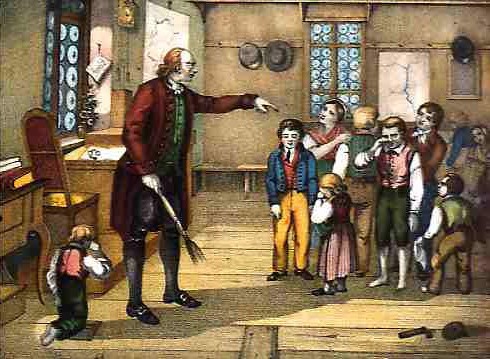

Saarländisches Schulmuseum Ottweiler
| Put in the terminology of game theory, smooth functioning of human societies depends on the dynamic cooperation between a high number of more or less selfish agents. The degree of selfishness (respectively altruism) exhibited by these agents has a pronounced influence on the society's harmonic functioning. In recent years, the neurobiology of altruistic behavior (including its evolution) has attracted considerable interest (e.g. Fehr & Fischbacher 2003, Henrich 2006). Hormones like Oxytocin and Vasopressin and their receptors have been implicated in the expression of confidence (Kosfeld et al. 2005) and the formation of pair-bonds (Nair & Young 2006) in mammals, including humans. |
| Although hard-core creationists might attribute social phenomena as altruism, empathy, and bonding to the boundless wisdom of God The Almighty, sober scientists are inclined to look for more prosaic explanations. If our ancestors, at some point of evolution, 'found it worth' to invest some of their genes into the synthetic machinery of peptides and pheromones (including their receptors) regulating social behavior, this investment most likely resulted in an increased number of offspring. To put it shortly: cooperation pays. |
| The degree of cooperation reaches astounding proportions in social insects as ants and bees. Although parallels have been drawn repeatedly between human and insect societies, a characteristic feature of human societies is a high degree of flexibility not encountered in insects. A newborn human being has the potential to adapt to a wide range of environments and social constellations. It does this if confronted with specific social cues as facial expressions or language during critical developmental stages. Each child has the tendency to imitate uncritically the behavior of the persons it relates to most closely. |
| The effort of a society to instruct their children in the best possible way is called education. In an impressive monograph, PJ Blumenthal (2003) described the fate of more than 100 cases of children that spent a large part of their youth in the wild or in isolation. The results of these cruel 'experiments of nature' were not les bons sauvages of Jean-Jacques Rousseau, but creatures more reminiscent of animals than of humans, in most cases resistant to any (belated) educational efforts. Not surprisingly so, they remained attached to the environments they were confronted with during their sensitive developmental stage for the rest of their lives. They might represent some kind of default state a human being is heading to, if education is not applied. |
| It might be speculated, that the uneducated human default state has to be aggressive, selfish, intolerant and cruel (i.e. anti-social), as a pre-requisite for the establishment of stable dynamic large-scale social equilibria (Nash equilibria - in game theory; see also Wolf et al. 2008 & Bowles 2008). Only education applied by societies against the natural resistance of the single units will result in stable dynamic networks, regulated by manners, culture, altruism, tradition, punishment, reciprocity, and fairness. Hormones and receptors will not do the job by themselves. They just constitute the endogenous mechanism that must be addressed by committed instructors: by us. |
| The efficiency and style of education has changed over the ages. The concept of single agents whose antagonism against common rules forced upon them must be overcome by force and pressure seems to vindicate old-fashioned educational principles (Bernhard Bueb 2006; see also figure at top). However, since the days of August Aichhorn (1925) and Fritz Redl (1951) we know, especially in Austria, that force and pressure are inadequate measures to deal with children, especially with neglected, aggressive ones. Nevertheless, Alexander S. Neill was thrown out of Austria in 1924 with his International School (Sonntagsberg, Gemeinde Rosenau, Amstetten), only later to become famous as "Summerhill". Elsewhere. |
| 11/06 < MB
(12/06) > 6/07 Education / Erziehung |
|
August Aichhorn (1925) Verwahrloste Jugend. Die Psychoanalyse
in der Fürsorgeerziehung. Leipzig, Internationaler Psychoanalytischer Verlag.
P.J. Blumenthal (2003) Kaspar Hausers Geschwister. Piper. S. Bowles (2008) Conflict: Altruism's midwife. Nature 456: 326-27. Bernhard Bueb (2006) Lob der Disziplin. Eine Streitschrift. List. Fehr E, Fischbacher, U (2003) The nature of human altruism. Nature 425: 785-791 Henrich J (2006) Cooperation, punishment, and the evolution of human institutions. Science 312: 60-61 Kosfeld M, Heinrichs M, Zak PJ, Fischbacher U, Fehr E (2005) Oxytocin increases trust in humans. Nature 435: 673-676 Nair HP, Young LJ (2006) Vasopressin and pair-bond formation: genes to brain to behavior. Physiology 21: 146-152 Redl F, Wineman D (1951). Children who hate. Glencoe, IL: The Free Press. Wolf M, van Doorn GS, Weissing FJ (2008) Evolutionary emergence of responsive and unresponsive personalities. PNAS 105: 15825-30 |